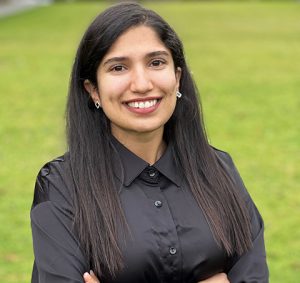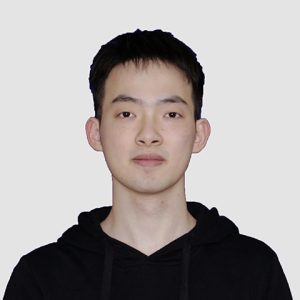
UW ECE doctoral students Marziyeh Rezaei (left) and Pengyu Zeng (right) have been named recipients of a 2025 Qualcomm Innovation Fellowship. They are conducting research aimed at enabling scalable, power-efficient optical links for the next generation of edge-cloud data centers supporting 6G infrastructure.
Qualcomm, a multinational corporation that creates microchips, software, and solutions related to wireless technology, recently announced that two UW ECE doctoral students will receive a 2025 Qualcomm Innovation Fellowship. These students are among only 34 recipients of this prestigious award in North America. The Fellowship program is focused on recognizing, rewarding, and mentoring graduate students conducting a broad range of technical research, based on Qualcomm’s core values of innovation, execution, and teamwork.
Fellowship recipients Marziyeh Rezaei and Pengyu Zeng are both doctoral students at UW ECE advised by Assistant Professor Sajjad Moazeni. In Moazeni’s lab, Rezaei and Zeng conduct research at the intersection of integrated system design and photonics, with applications in computing and communication, sensing and imaging, and the life sciences.
The Fellowship program empowers graduate students like Rezaei and Zeng to take giant steps toward achieving their research goals. Students from top American and international universities are encouraged to apply and submit a proposal on any innovative idea of their choosing. Winning students earn a one-year fellowship and are mentored by Qualcomm engineers to facilitate the success of the proposed research project.
“Marziyeh and Pengyu are developing the next generation of coherent optics for connectivity, from data centers to 6G networks. I truly enjoy working with students who take on challenging, real-world problems, and I’m proud of them!”
— UW ECE Assistant Professor Sajjad Moazeni
Rezaei and Zeng proposed developing technology that connects tens of thousands of computer processor chips in a data center with light moving through optical fibers, which is almost lossless compared to conventional electrical signals in copper wire. Their novel approach includes making use of ultra-low power analog circuits to replace conventional, power-hungry components in optical links. Both Rezaei and Zeng will be actively involved in the design, implementation, and testing of the proposed solution, each contributing their expertise to different core components of the system. They will be working under Moazeni’s guidance, along with mentorship from Qualcomm engineers Bhushan Asuri and Mali Nagarajan.
This new and improved technology could enable scalable, power-efficient optical links for the next generation of edge-cloud data centers supporting 6G infrastructure. Power-efficient, high-throughput optical interconnects are critical for 6G networks, as global mobile data traffic is expected to exceed 1,000 exabytes per month by 2030, demanding optical links that can support terabit-per-second speeds while maintaining low energy consumption for sustainable operation. Rezaei and Zeng’s proposed coherent optical links provide an innovative way to address the scalability, speed, and energy-efficiency limitations of today’s optical interconnects.
Marziyeh Rezaei

UW ECE graduate student Marziyeh Rezaei
Marziyeh Rezaei received her bachelor’s degree in electrical engineering with a focus on electronic integrated circuit design in 2020 from Sharif University of Technology in Tehran, Iran. She worked as a research assistant in the Robotics, Perception and AI Lab at the Chinese University of Hong Kong during summer 2019 and at NVIDIA in summer 2024. Currently, she is a fourth-year doctoral student at UW ECE. In 2022, she was awarded a Diversity in Technology Scholarship from Cadence corporation for her outstanding leadership skills, academic achievement, and drive to shape the world of technology. Her prior research includes exploring the feasibility and advantages of proposed coherent links for intra-data center applications, which can also be extended to fronthaul and midhaul interconnects.
“Winning this fellowship is a meaningful recognition of the work I’ve poured into my doctoral degree. It feels incredibly rewarding to have the excitement, dedication, and effort I’ve invested in this project acknowledged,” Rezaei said. “Achieving this goal before graduation has been a dream come true, and this support will help us bring our proposal to life and demonstrate a working proof of concept to the research community.”
Pengyu Zeng

UW ECE graduate student Pengyu Zeng
Pengyu Zeng is a second-year doctoral student at UW ECE. He received his bachelor’s degree in electronic information engineering in 2023 from Wuhan University in Wuhan, China, with a focus on analog circuits design. At UW ECE, his research focuses on analog and mixed-signal circuits design for high-speed optical transceivers. His current research project is developing ultra-low power co-packaged optical interconnects based on silicon photonics.
“Receiving this fellowship is a meaningful recognition of the value of our research,” Zeng said. “The financial and technical support enable us to further advance this innovative project with greater focus and motivation.”
Learn more about the Qualcomm Innovation Fellowship program on the company’s website.

